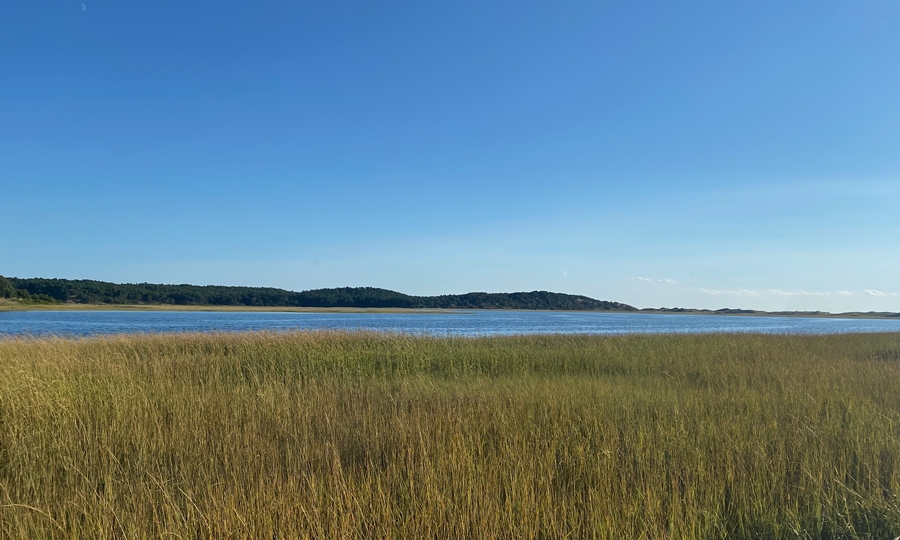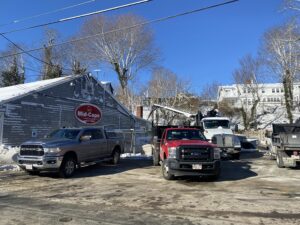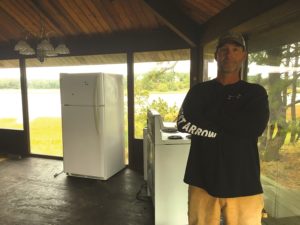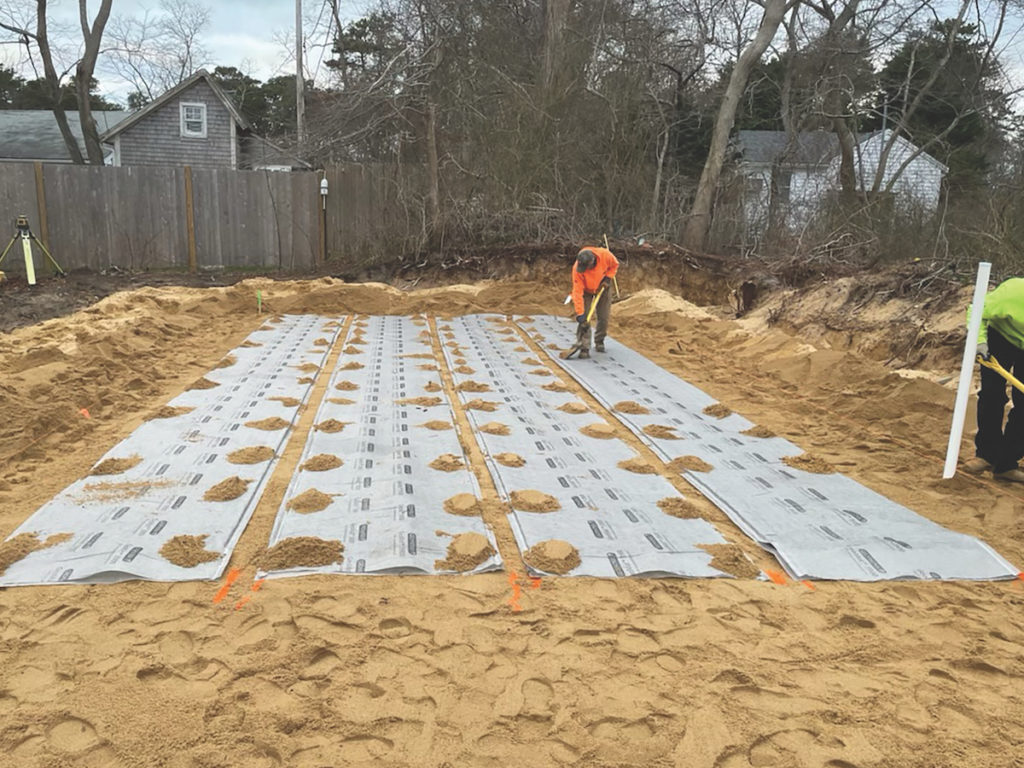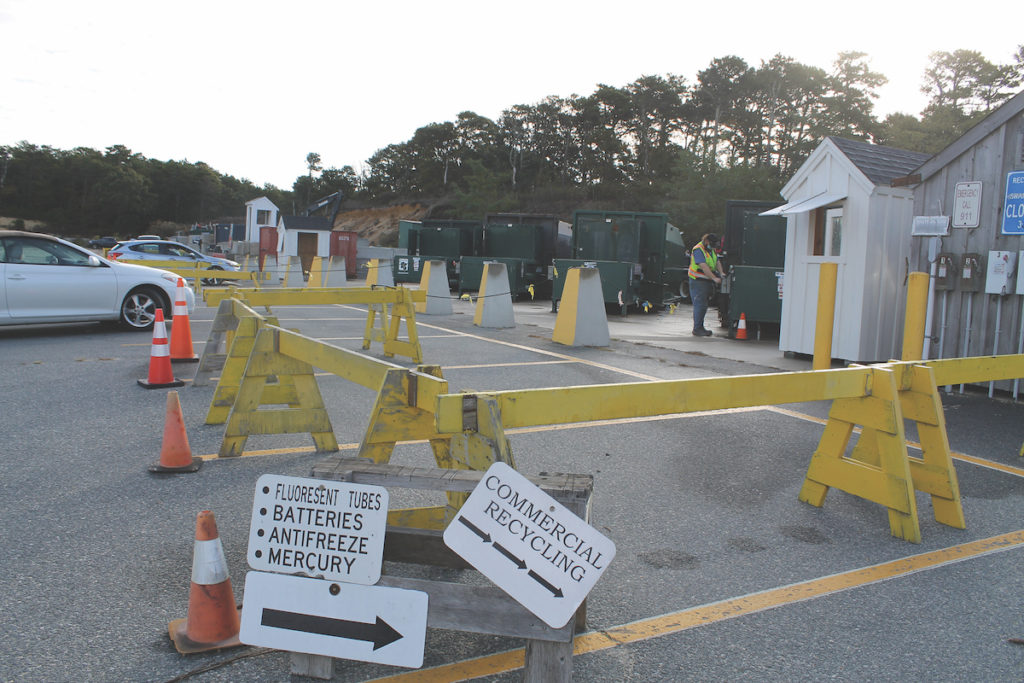This article was updated on July 17, 2025.
WELLFLEET — The select board asked the board of health on July 8 to “temporarily suspend its current septic regulations,” reverting to 2017 rules, until the two boards meet to discuss the rules and the town receives feedback on its Targeted Watershed Management Plan from the Mass. Dept. of Environmental Protection (DEP). The motion for the request was introduced by chair John Wolf and passed unanimously.
Meanwhile, the town’s health agent, Heith Martinez, has resigned and three members of the board of health — Deborah Freeman, Janet Drohan, and chair Nick Picariello — have dropped off the board, complicating Wellfleet’s pressing need to manage wastewater treatment and reduce nitrogen pollution in the Wellfleet Harbor watershed.
In a letter to the board of health, the select board said the reasons for pausing the septic regulations included the need to couple them with the watershed plan’s phased approach and the “unsustainable burden” that continuing to enforce septic upgrades would place on residents. The members of the board of health have not yet commented publicly on the letter.
The two boards are scheduled to hold a joint session on July 23 to discuss amending the regulations, which were last modified in January. But that discussion will now take place without four people who have worked to oversee health regulations for several years. Martinez announced his resignation at the board of health’s July 9 meeting. Freeman withdrew her application to serve another three-year term on the health board on July 1. Drohan announced her resignation from the board in a letter on July 15. The following day, Picariello submitted his own resignation, effective immediately.
In his letter to the select board and Town Administrator Tom Guerino, Picariello wrote that his service on the board “had become too stressful, too contentious, less satisfying, and less enjoyable. Time is precious, especially at this point in my life, and I don’t want to spend any of it in what can be a toxic working environment.”
The board of health had changed the septic regulations in January in part to help reduce nitrogen runoff into the watershed as the state has required for “nitrogen sensitive areas,” a designation that Wellfleet Harbor received in 2023. Another round of revisions was needed, Martinez said, to ensure that the rules are consistent with the revised Targeted Watershed Management Plan.
That plan was submitted to the state in May and is open for a public comment until Aug. 8, Town Administrator Tom Guerino told the Independent — an extension of the original July 11 deadline.
Following suggestions made by former select board vice chair Michael DeVasto, the plan was revised to meet nitrogen-reducing requirements by relying less on existing regulatory triggers to upgrade a property’s septic system — such as the sale of the property, system failure, or new construction — and more on targeting upgrades based on proximity to sub-watersheds and accounting for possible sewer expansion.
Martinez’s Resignation
Martinez said he had accepted a position as administrative assistant at the Wellfleet Fire Dept. and resigned as health agent effective July 7.
Until a new health agent is hired, he added, he would advise the health and select boards as they work to revise the regulations. “I’m going to help out a few hours a week to try to patch things along over the next 60 days,” he told the Independent.
Martinez had served as health agent since October 2023. The previous agent, Hillary Greenberg-Lemos, resigned in April 2023. Martinez cited personal reasons for his departure, including stress and an interest in the fire dept. job.
During his tenure, Martinez steered the town toward compliance with state requirements to reduce nitrogen runoff into Wellfleet Harbor by helping to draft new triggers for upgrading septic systems and monitoring those systems’ performance. “As far as the new regulations and the Targeted Watershed Management Plan, that was a huge part of the job and a huge stressor,” he said. “There’s no question about that.”
The challenges of working with the select board to implement the regulations added to the pressure, Martinez said. “To sit in a meeting where you’re just being badgered,” he said, made the work more difficult. “It was not a team effort,” he added.
Select board member Sheila Lyons said on July 8 that Martinez “got a lot of grief” for enforcing the septic regulations according to DEP standards. “It was a tough spot,” she said.
Martinez’s starting salary as health agent was $95,000, he said; the starting salary for his new fire dept. job is $88,000.
After Martinez’s departure, the only remaining full-time staff member at the health dept. is Assistant Health and Conservation Agent Gary Locke, Martinez said. The town has not appointed an interim health agent, according to Guerino.
“If recruitment drags out, we will appoint an acting agent,” Guerino said, adding that some inspections and water testing would be done by the county. The town has posted a listing for public health agent on its website, along with unfilled housing coordinator and finance director jobs.
Health Board Turnover
Freeman withdrew her application for reappointment to the board of health on July 1, according to an email reviewed by the Independent.
Her three-year term on the board ended on June 30. The select board debated her reappointment on June 25 but made no decision.
The select board appointed Casey Schmidt to the health board seat vacated by Freeman last week. Schmidt is a licensed clinician who has worked in community health care since 2014, according to her application for the appointment.
Freeman, an attorney who has served on the board of health since 2022, said she hadn’t planned to leave until she learned that the select board had debated whether to reappoint her at its June 25 meeting.
Freeman said she left to avoid becoming a distraction from the health board’s role in cleaning up Wellfleet Harbor and implementing the plan to reduce nitrogen runoff.
Drohan had been a member of the board of health for more than 12 years. In her resignation letter,
she asked for exit interviews with Guerino and Wolf “to share positive observations of needed process changes to benefit the mission of our Board of Health and their relationship with all our constituents.”
The Timeline for New Rules
One key issue the boards need to address together, Freeman and Martinez said, is the timing of new rules as the town’s sewer plan takes shape. Some members of the select board had taken issue with the board of health’s choice to amend the regulations before the town had submitted its watershed plan and finalized a sewer district.
“I’ve been on the record many times saying the board of health was premature instituting these changes,” member Josh Yeston had said at the select board’s June 25 meeting. “I think they should have waited for the Targeted Watershed Management Plan to be accepted, and I appreciate the board of health is now willing to collaborate with the select board on finding a new path forward.”
If and when the state certifies the watershed plan, chair John Wolf said, the two boards should work together to “reset” progress on septic upgrades and the sewer plan.
“We need to come up with equitable solutions,” Wolf added. “We still have a sewer district to plan before we start saddling people with insurmountable expenses.”
At the board of health’s July 9 meeting, chair Nick Picariello said his board was responsible for enforcing existing regulations with the DEP’s guidance whether or not the hybrid plan to address nitrogen runoff is approved. “Throughout the town, in certain quarters, we’re the bad guys on all of this,” he said. “That’s not the case.”
Picariello added that the select board, not the board of health, was responsible for determining an eventual sewer district’s size — and thus where requirements to upgrade septic systems were likely to take effect — because the town voted to make the select board serve as sewer commissioners in May.
The board of health will hold a public hearing on July 30 about proposed septic and tobacco rule changes, which will be made public in advance, Martinez said.
